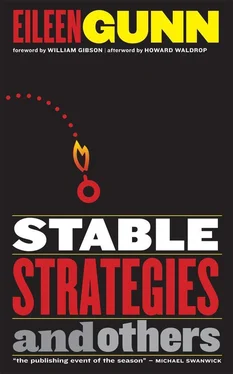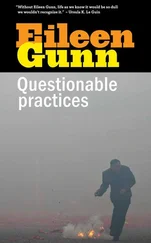“We got us a problem here, Chick,” said Norton. He looked over at Elizabeth and nodded. “You tell him about it, kid.”
First she told him about her brother. “Non-trivial, young lady,” said the Chickenheart. “Non-trivial, but easy enough to fix. Let me take care of it right now.” He went rigid and quiet for a few seconds, as though frozen in time. Then he was back. “Now, then, young lady,” he said. “We’ll talk if you like.”
So Elizabeth told the Chickenheart about Sheena and Oginga, about the testing center and the wet sweater and the monitor telling her to clean up the spit. Even though she didn’t have to say a word, she told him everything, and she was sure that if he wanted to come up with a solution, he could do it.
The Chickenheart seemed surprised to hear about the euthanasia center, and especially surprised that Sheena was going to be sent there. He addressed Norton. “I know I’ve been out of touch, but I find this hard to believe. Mr. Norton, have you any conception of how difficult it can be to obtain components like this? Let me investigate the situation.” His face went quiet for a second, then came back. “By gad, sir, it’s true,” he said to Norton. “They say they’re optimizing for predictability. It’s a mistake, sir, let me tell you. Things are too predictable here already. Same old ideas churning around and around. A few more components like that Sheena, things might get interesting again.
“I want to look at their records.” He paused for a moment, then continued talking.
“Ah, yes, yes, I want that Sheena right away, sir,” he said to Norton. “An amazing character. Oginga, too — not as gonzo as the girl, but he has a brand of aggressive curiosity we can put to use, sir. And there are forty-six others with similar personality profiles scheduled for euthanasia today at two.” His face went quiet again.
“What is he doing?” Elizabeth asked Norton.
“Old Chickenheart’s got his hooks into everythin’,” Norton replied. “He just reaches along those pathways, faster’n you can think, and does what he wants. The altered data will look like it’s been there all along, and ain’t nobody can prove anythin’ different.”
“Done and done, Mr. Norton.” The Chickenheart was back.
“Thank you, Mr. Chickenheart,” said Elizabeth, remembering her manners. “What’s going to happen to Sheena and Oginga now?”
“Well, young lady, we’re going to bring your friends right into the system, sort of like the sysop, but without, shall we say, official recognition. We’ll have Mr. Norton here keep an eye on them. They’ll be our little surprises, eh? Timebombs that we’ve planted. They can explore the system, learn what’s what, what they can get away with and what they can’t. Rather like I do.”
“What will they do?” asked Elizabeth.
“That’s a good question, my dear,” said the Chickenheart. “They’ll have to figure it out for themselves. Maybe they’ll put together a few new solutions to some old problems, or create a few new problems to keep us on our toes. One way or the other, I’m sure they’ll liven up the old homestead.”
“But what about me?” asked Elizabeth.
“Well, Miss Elizabeth, what about you? Doesn’t look to me as though you have any cause to worry. You passed your tests yesterday with flying colors. You can just go right on being a little girl, and some day you’ll have a nice, safe job as an executive. Maybe you’ll even become netexec, who knows? I wiped just a tiny bit of your brother’s brain and removed all records of your call. I’ll wipe your memory of this, and you’ll do just fine, yes indeed.”
“But my friends are in here,” said Elizabeth, and she started to feel sorry for herself. “My dog, too.”
“Well, then, what do you want me to do?”
“Can’t you fix my tests?”
The Chickenheart looked at Elizabeth with surprise.
“What’s this, my dear? Do you think you’re a timebomb, too?”
“I can learn to be a timebomb,” said Elizabeth with conviction. And she knew she could, whatever a timebomb was.
“I don’t know,” said the Chickenheart, “that anyone can learn that sort of thing. You’ve either got it or you don’t, Miss Elizabeth.”
“Call me Lizardbreath. That’s my real name. And I can get what I want. I got away from my brother, didn’t I? And I got here.”
The Chickenheart raised his thin, black eyebrows. “You have a point there, my dear. Perhaps you could be a timebomb, after all.”
“But not today,” said Lizardbreath. “Today I’m gonna learn to spit.”
AUTHOR’S NOTE:
This is a story that technology has made some inroads on. I wrote it after the Mac was created, but before the ghastly condescension of Microsoft’s animated paperclip. It was nominated for the Hugo award in 1990.
I consulted with my nieces, Erin Elizabeth (Lizardbreath) and Kelsey, then aged eight and five years, to achieve an acceptable level of ferocity and spunk.
This is the story of a woman who lost her sock at the laundromat and discovered it contained part of her soul. This is the way the story is always told. It was told to me this way and I will tell it to you this way. There is no other way to tell this story.
It begins in the laundromat, of course. She was doing her laundry, this woman. She washed her socks, she washed her shirt, and she washed her blue jeans. She even washed her underwear.
Then she gathered up her things and put them in the dryer. This may be the point at which she lost her sock, nobody is sure. Or it may be that she lost her sock later, when she took her clothes out of the dryer. Who can tell about these things so long after they happen?
At any rate, when she got home, she was missing one of her socks. It was just an ordinary grey ragg-wool sock. You probably have a pair yourself. Everyone I know has a pair of these socks. Some have two pair.
This woman, she only had one pair. So she was annoyed at missing the sock, and she went back to the laundromat in search of it. But the sock was nowhere to be found. Who would take just one sock, she thought, and she went home.
That very day, she noticed something peculiar about her left foot. It dragged, it stuck out wrong. It tripped the woman up when she walked, and it seemed to have a mind of its own. It’s sulking at the loss of its sock, she thought. I will pay it no mind, and it will soon forget.
But the foot did not forget. Instead, its will seemed to grow stronger, as if it were seeking to dominate her whole body. I cannot have my body ruled by my foot, she thought. I’ll show it who’s master. So she sat at home all weekend and looked out the window. Although her foot twitched and throbbed, she refused to give in. It was not a fun weekend.
On Monday, she had to go to work. She got up, lifted her foot out of bed, and limped to the breakfast table. She wrestled her foot into a thin white sock and jammed it into her shoe. She dragged it down the street to the trolley line. As she rode the trolley, her foot jiggled and tapped its way out into the aisle, jutted straight out ahead of her, stomped up and down with rage. Other passengers gave her sharp looks and told her to keep her feet to herself.
At work, she avoided other people as much as she could. She kept her foot under her desk, but it continued to jerk up and down, sometimes striking the inside of the metal desk with a thwanging sound. The woman at the next desk became impatient and took to slamming her stapler around very noisily.
The next day, she called in sock. I mean sick, she called in sick. Her foot was becoming more agitated. She decided to let the fool thing have its way. It walked out the door and down the street, taking her past the laundromat, past the grocery store, past the gas station and up to the vacant lot.
Читать дальше












